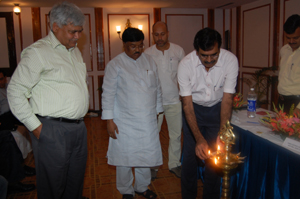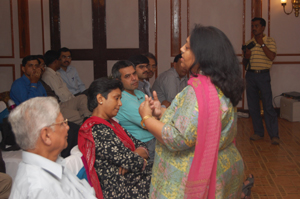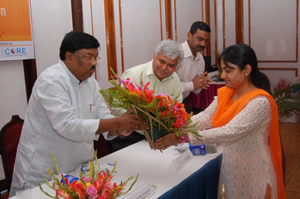 The conference report on:
The conference report on:
Role of digital content for e-governance and education
by Nidhi Sharma at Ranchi, Jharkhand (nidhi@defindia.net)
“In the way of delivery of public services with the help of computer technology, or in other words, successful e-governance, there are two main hindrances. To begin with, there is no proper application as far as implementation of the mechanism is concerned. The incident is not captured on the spot. The whole exercise is champion driven, where the person now in command for some reason feels the efforts put in by the one before him or her is useless. “
These views, expressed by Jharkhand IT secretary RS Sharma at the panel discussion during the two-day conference on Digital content and Services for e-governance and education, explained the stumbling blocks in the of path e-governance.
The conference, organised by Jharkhand Agency for promotion of Information Technology (JAPIT) and Digital Empowerment Foundation, was a massive two-day affair at  Hotel Ranchi Ashoka, Doranda, Ranchi. September 12 and 13 witnessed the gathering of eminent personalities from various fields for the confrence, which also comprised of the jury members of Manthan award 2008.
Hotel Ranchi Ashoka, Doranda, Ranchi. September 12 and 13 witnessed the gathering of eminent personalities from various fields for the confrence, which also comprised of the jury members of Manthan award 2008.
The IT Secretary said that unless the departments do not realize how cost effective technology can prove for them, progress will not be attained. He gave the example of the treasury department, where technology had helped in saving at least 10,000 papers per month.
RS Sharma took pride in explaining how the treasury, registration and transport departments of Jharkhand were glowing examples in the field of e-governance .
 Adding to his views, Amol Goje, Director, Vidya Pratisthan Institute of Information Technology , Pune, said , “The fact that we are not making policies to transfer knowledge is also a big issue. If we work in the right manner, then we can do away with the futile exercise of developing software again and again.” Giving the example of mobile computer teaching vans, Mr Goje explained how imparting proper computer knowledge can help in successful implementation of e-governance.
Adding to his views, Amol Goje, Director, Vidya Pratisthan Institute of Information Technology , Pune, said , “The fact that we are not making policies to transfer knowledge is also a big issue. If we work in the right manner, then we can do away with the futile exercise of developing software again and again.” Giving the example of mobile computer teaching vans, Mr Goje explained how imparting proper computer knowledge can help in successful implementation of e-governance.
Speaking on the occasion, Arwind Kumar, head of the Jharkhand Planning Commission said that there was a need of business re-engineering process, where things could be made to happen fast. “The government has to realize that noboday in todays time is willing to wait for 15 days to have their work done. Therefore, regular upgradation is required. For example, if a passport can be made in two days, then so should a ration card be ” Dr Kumar explained.
Many experts were of the opinion that the filing system needs to be digitised the way it is in various private companies.
The Manthan Jury members were also enthusiastic in expressing their views on the topic. They all stood up from efforts at every level to help in making use of digital content for e-governance and education.
 Ashish Garg, who is the India head of Global e Schools and Communities Initiative and one of the jury members, was very impressed by the field trip taken to the recently established prison at Ranchi. She spoke of how the live example of computer literacy for jail inmates had been eye-opening for her and the rest. Managing the prison with computer technology was a brilliant example of e-governance, she said.
Ashish Garg, who is the India head of Global e Schools and Communities Initiative and one of the jury members, was very impressed by the field trip taken to the recently established prison at Ranchi. She spoke of how the live example of computer literacy for jail inmates had been eye-opening for her and the rest. Managing the prison with computer technology was a brilliant example of e-governance, she said.
“We have to touch the last man, because he is the one at the receiving end. This is the duty of the government ,” spoke Mr A K Chug, a senior IAS officer and member, Board of Revenue, who explained how we will miss the bus if we do not change our attitude in adopting technology. “We don’t just need Information Communication Technology for educating children, we need it to educate teachers and class IV employees as well.”
He explained how reaching out to large number of schools was not practical and the CSCs could be made use of for this purpose.
The eminent people present on the occasion were in consensus that the ‘e’ word has to move to the villages for reaching the masses. Also, there was urgent need for quality content in the field of e-education.
On questions about the lamentable condition of the Common Service Centres in Jharkhand, where 4500 of them are to be ruled out and 30 per cent would fail to verify, RS Sharma explained that the government could not be blamed for the performance of the CSCs, as it is a private venture, where the government could only act as a service provider.
 Experts gave the example of how CSCs in West Bengal were making upto Rs 15,000 a month. What we need to look at is that the money given by the not so rich villagers for the CSCs is put to best use and quality equipment is brought, something that was not happening.
Experts gave the example of how CSCs in West Bengal were making upto Rs 15,000 a month. What we need to look at is that the money given by the not so rich villagers for the CSCs is put to best use and quality equipment is brought, something that was not happening.
Giving a new light to the whole issue of education in the age of Digitization, Mr K J Kang of Designmate, an Education Service provider into animation films, said that if we make a stage of development, we have to go back all over again. Therefore, we have to keep up with the times and hopefully, technologies like stereovision would become very popular in the next few years.
All other eminent technocrats, including the Vice-Chancellor of BIT Mesra, Ranchi, PK Barhai, were vocal in expressing that we have to include technology in every sphere for larger interest.
“Governance in 21st century has to be e-governance and there is no way out,” these words, coming from senior journalist Manoj Prasad of The Indian Express, gave the essence of what all the government and private efforts have been about.
